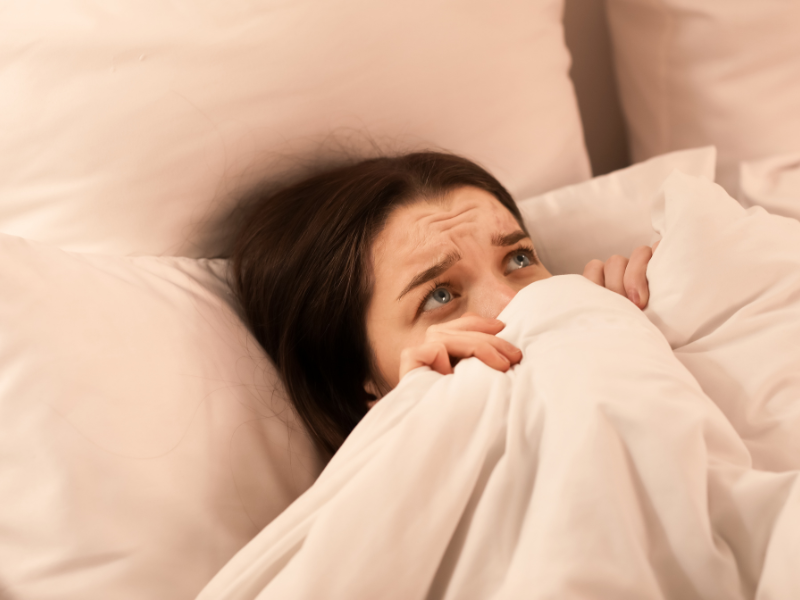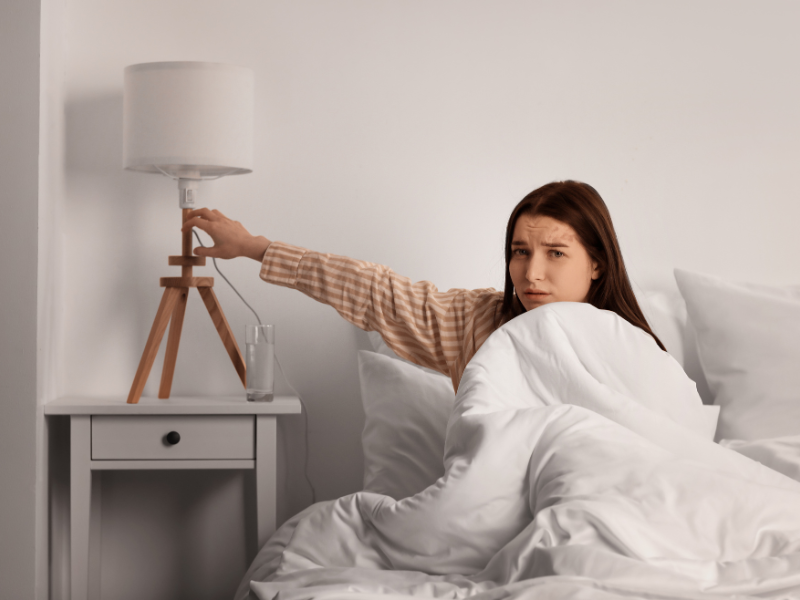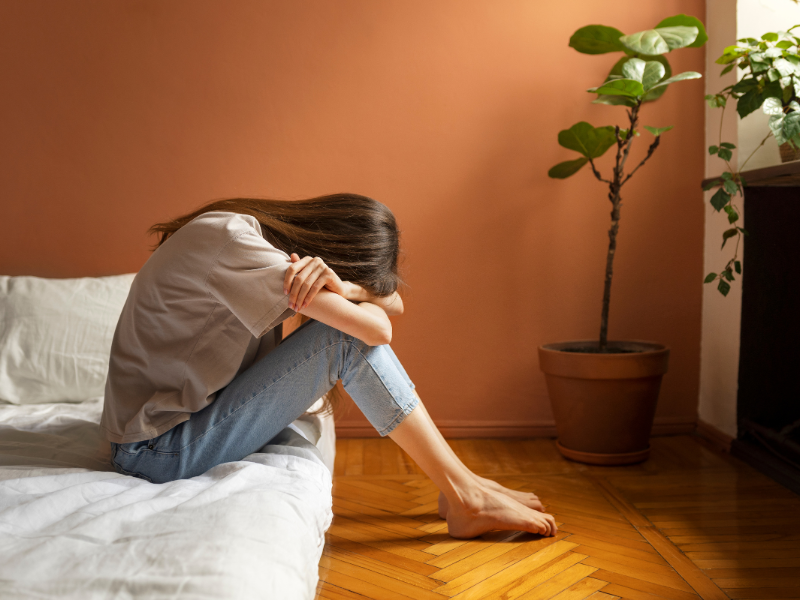


Sleep is a natural activity the body craves after a hard day’s work. But while some anticipate the act of getting into bed, turning off the lights, and entering dreamland, others dread it all together. Let’s discuss the fear of sleeping at night and explore ways to overcome this obstacle.
Sleep phobia or somniphobia refers to the fear of falling asleep. From feeling apprehensive about sleeping to full-on fear of nightmares and never waking up, sleep phobia is on a spectrum and affects people of all ages and socioeconomic backgrounds.
Anxiety and sleep disorders also tend to overlap. In other words, anxiety can affect sleep, and sleep may affect anxiety. While a person with anxiety has difficulty falling asleep, someone with a sleep disorder may feel anxious and afraid of not getting the rest they need, creating a never-ending cycle.

The exact cause isn’t known, but some factors at play are:

Somniphobia, or the fear of sleeping, can show itself through various symptoms that might affect someone’s daily life. Somniphobia can cause anxiety or worry about going to bed and falling asleep. This fear might be linked to nightmares, night terrors, or the feeling of losing control while asleep.
Physical symptoms can include increased heart rate, sweating, and trembling at the thought of going to sleep. Individuals with somniphobia might also develop patterns of insomnia, finding it challenging to get the necessary amount of rest. Understanding and addressing these symptoms is crucial for seeking support and developing strategies to overcome somniphobia, promoting a healthier relationship with sleep.
To reduce sleep anxiety, healthy boundaries around sleep or “sleep hygiene” are needed. This means establishing a routine before bed, making the bedroom comfortable for sleep, cutting back on caffeine, and managing stress.
But if the fear of sleeping at night is severe, seeking a professional for help may be appropriate.
Let’s take a closer look at these strategies:
This means going to bed at the same time every night — and yes, even on the weekends. A healthy bedtime routine starts by winding down an hour before bed, silencing electronic devices, tending to personal hygiene, dimming the lights, and ends by taking part in a relaxing activity like reading.
So, why is consistency important? Research shows that a consistent sleep schedule improves the quality of sleep and maintains the body’s circadian rhythm, i.e., the internal clock. Moreover, cardiovascular functions like blood pressure and heart rate follow circadian patterns, promoting restorative sleep and optimal health.

Research shows that those who have higher quality sleep have bedrooms optimized for sleep. This includes:

Caffeine is a psychoactive substance that prolongs sleep latency, i.e., the amount of time it takes for a person to fall asleep, reducing total sleep time, sleep efficiency, and sleep quality. It also worsens anxiety and blocks adenosine, a sleep-promoting chemical produced in the brain during waking hours. When caffeine blocks this chemical, it will interfere with the circadian rhythm, keeping a person awake and alert. Moreover, the recommended cut-off time for caffeine is at least six hours before bedtime.
It’s important to be mindful of stress as high levels can trigger the body’s stress response, elevating the hormone cortisol and disrupting sleep. To manage stress, practice coping mechanisms before bed like meditation and journaling, and avoid watching the news or upsetting television.

If the fear of sleeping at night is severe, a therapist can help. Treatment options include cognitive-behavioral therapy, exposure therapy, and medication.
Cognitive therapy reduces distress before bed and requires a person to go to bed and wake up at specific times, i.e., sleep restriction, to allow the body to develop a sleeping pattern.

Safe and effective reatment for somniphobia, the extreme anxiety and fear around sleep, typically involves a combination of therapeutic approaches. Cognitive-behavioral therapy (CBT) is a common and effective method, helping individuals identify and challenge negative thought patterns associated with sleep. Relaxation techniques, such as deep breathing or progressive muscle relaxation, can be taught to manage anxiety and promote a calm bedtime routine.
Gradual exposure therapy, where individuals face their fear of sleep in a controlled manner, is another effective treatment option to desensitize them to anxiety triggers. Creating a comfortable and calming sleep environment and maintaining a consistent sleep schedule can also contribute to alleviating extreme fear of sleep. In severe cases, medication may be considered under the guidance of a healthcare professional.
Seeking support from a therapist or counselor who specializes in sleep-related issues and forms of treatment can provide tailored strategies for overcoming the fear of going to sleep and fostering a positive relationship with sleep.
While the above strategies are designed to curb the fear of sleeping at night, they’re not instantaneous as the body needs time to adjust to new rituals and routines.
To bridge the gap, get some ShutEye® — your personalized one-in-all app to help you relax and sleep. From monitoring sleep cycles to enhancing sleep environment, ShutEye® is the sleep app you’ll never want to go a night without.
Caddick, Z. A., Gregory, K., Arsintescu, L., & Flynn-Evans, E. E. (2018). A review of the environmental parameters necessary for an optimal sleep environment. Building and Environment, 132, 11–20. https://doi.org/10.1016/j.buildenv.2018.01.020
Scharf, M. T., Naidoo, N., Zimmerman, J. E., & Pack, A. I. (2008). The energy hypothesis of sleep revisited. Progress in Neurobiology, 86(3), 264–280. https://doi.org/10.1016/j.pneurobio.2008.08.003